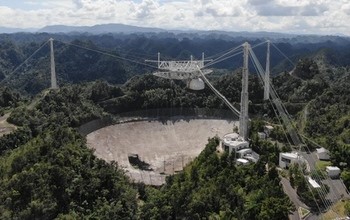The week of December 7-13 takes us from Lunar Day 22 to Day 29. This week we will highlight Montes Recti, the Straight Range, viewable early Tuesday morning, and the collapse of the Arecibo radio telescope.

The Straight Range is a small range of irregular ridges that is located in the northern part of Mare Imbrium. Montes Recti is an unusually linear formation (hence the name) that forms a line from east to west. It is about 56 mi. in length, and only 12 mi. wide. The peaks rise to heights of up to 1.1 mi.
The small crater Montes Recti B lies in the eastern part of the range. To the west are the Jura Mountains and to the east are the Teneriffe Mountains.
OF ADDITIONAL INTEREST IN SPACE:
On December 21st Jupiter & Saturn will be the closest they have ever been in 397 years, an event called “the Great Conjunction.” At that time they will be only 0.1 degrees apart. Look for them in the south-west shortly after sunset. The brighter one is Jupiter. Start observing them now and notice how every night they will creep closer together until Dec. 21st (which, coincidentally, is the Winter Solstice, the official beginning of winter, and the shortest day of the year).
On the November 23rd blog, we talked about the demise of the Arecibo Telescope, a radio telescope that is 1,000 ft. in Puerto Rico. It has now undergone a catastrophic collapse. Click below to see a video of the collapse:
======================
It is highly recommended that you get a copy of Sky and Telescope’s Field Map of the Moon, the very finest Moon map available for use at the telescope. It is available for $10.95 at www.skyandtelescope.com and on Amazon. All features mentioned in this blog will be keyed to the grid on the Field Map and will look like this: Plato: [NW/D9]
Credits:
Courtesy of Gray Photography of Corpus Christi, Texas
Lunar photos: NASA / USGS / BMDO / LROC / ASU / DLR / LOLA / Moon Globe. Used by permission
- Rupes Cauchy: A Best Known Fault on the Moon - July 22, 2024
- Moon Crater Schickard – Crater Floor has Stripes - July 15, 2024
- Moon Craters Langrenus and Vandelinus - July 8, 2024